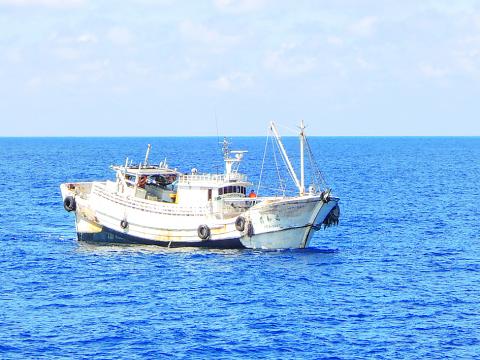Democratic Progressive Party (DPP) lawmakers yesterday urged the government to submit plans to create a ministry for maritime affairs within one year.
Additionally, a basic law governing maritime affairs should be passed by late next year, lawmakers Lai Jui-lung (賴瑞隆), Chen Man-li (陳曼麗) and Kolas Yotaka told a news conference at the legislature.
The measures are to help integrate maritime policy across sustainable development, research and sea tourism, they said.

Photo: Huang Hsu-lei, Taipei Times
Directorate-General of Personnel Management official Yang Hsiu-chen (楊秀珍) said the government is to complete a draft bill for review at the next session of the Legislative Yuan.
In June 2015, the legislature passed the Organization Act of the Ocean Affairs Council (海洋委員會組織法), which would have mandated the creation of the ocean affairs council in July last year.
However, the legislators who took office in March last year passed a resolution to suspend the council’s promulgation.
Lai, Chen and Chinese Nationalist Party (KMT) Legislator Apollo Chen (陳學聖) laster proposed amendments to the law that would upgrade the ocean affairs council to a ministry-level organization.
Distributing responsibilities over environmental protection, tourism and other maritime issues to multiple agencies has the effect of diluting the government’s efforts, said Lai, a former Kaohsiung Marine Bureau director.
“On the day before World Oceans Day, I call on the Executive Yuan to accelerate the establishment of the ministry for maritime affairs; only a powerful, responsible agency can promote policies,” he said.
Lai said Indonesia and Sweden have a ministry-level agency to supervise maritime affairs, while Japan and Canada have a basic law governing oceanic issues.
As a maritime nation, Taiwan urgently needs a ministry of maritime affairs, Lai said.
Lawmakers suspended the council because they believe the President Tsai Ing-wen (蔡英文) administration should have a ministry-level establishment overseeing seas, Lai said.
Kolas Yotaka said a maritime affairs ministry is symbolic of Taiwan’s identity as an independent state and would help many Aborigines who live by rivers and the ocean.
Calls to create a maritime affairs ministry have been raised many times over the past two decades, National Taiwan Ocean University Institute of Marine Affairs and Research Management dean Julia Huang (黃向文) said.
The fishing industry’s use of oceanic resources are poorly regulated and are misunderstood by the government, she said.
Ocean acidity levels and marine debris in the nation’s seas are not included in Environmental Protection Administration surveys, Huang said.
There are a large number of international laws regulating the use of the sea that the government has yet to implement, she said.
“Although Taiwan prides itself as a maritime nation, government organizations are poorly coordinated and communications between them is spotty,” she said.
“The public has gained more ocean awareness and there are many initiatives by private citizens to clean beaches or protect the ocean. The government should not fall behind the people’s lead. A ministry of maritime affairs should be created as soon as possible,” she added.
Greenpeace Taiwan oceans campaigner Yen Ning (顏寧) said the past two administrations had both affirmed the importance of the ocean, but did little to resolve the competing needs of resource use, conservation and development.
Taiwan should have a ministry of maritime affairs at the earliest possible time and the government should push for truly forward-looking policies, Yen said.

Alain Robert, known as the "French Spider-Man," praised Alex Honnold as exceptionally well-prepared after the US climber completed a free solo ascent of Taipei 101 yesterday. Robert said Honnold's ascent of the 508m-tall skyscraper in just more than one-and-a-half hours without using safety ropes or equipment was a remarkable achievement. "This is my life," he said in an interview conducted in French, adding that he liked the feeling of being "on the edge of danger." The 63-year-old Frenchman climbed Taipei 101 using ropes in December 2004, taking about four hours to reach the top. On a one-to-10 scale of difficulty, Robert said Taipei 101

Nipah virus infection is to be officially listed as a category 5 notifiable infectious disease in Taiwan in March, while clinical treatment guidelines are being formulated, the Centers for Disease Control (CDC) said yesterday. With Nipah infections being reported in other countries and considering its relatively high fatality rate, the centers on Jan. 16 announced that it would be listed as a notifiable infectious disease to bolster the nation’s systematic early warning system and increase public awareness, the CDC said. Bangladesh reported four fatal cases last year in separate districts, with three linked to raw date palm sap consumption, CDC Epidemic Intelligence

Taiwanese and US defense groups are collaborating to introduce deployable, semi-autonomous manufacturing systems for drones and components in a boost to the nation’s supply chain resilience. Taiwan’s G-Tech Optroelectronics Corp subsidiary GTOC and the US’ Aerkomm Inc on Friday announced an agreement with fellow US-based Firestorm Lab to adopt the latter’s xCell, a technology featuring 3D printers fitted in 6.1m container units. The systems enable aerial platforms and parts to be produced in high volumes from dispersed nodes capable of rapid redeployment, to minimize the risk of enemy strikes and to meet field requirements, they said. Firestorm chief technology officer Ian Muceus said

MORE FALL: An investigation into one of Xi’s key cronies, part of a broader ‘anti-corruption’ drive, indicates that he might have a deep distrust in the military, an expert said China’s latest military purge underscores systemic risks in its shift from collective leadership to sole rule under Chinese President Xi Jinping (習近平), and could disrupt its chain of command and military capabilities, a national security official said yesterday. If decisionmaking within the Chinese Communist Party has become “irrational” under one-man rule, the Taiwan Strait and the regional situation must be approached with extreme caution, given unforeseen risks, they added. The anonymous official made the remarks as China’s Central Military Commission Vice Chairman Zhang Youxia (張又俠) and Joint Staff Department Chief of Staff Liu Zhenli (劉振立) were reportedly being investigated for suspected “serious